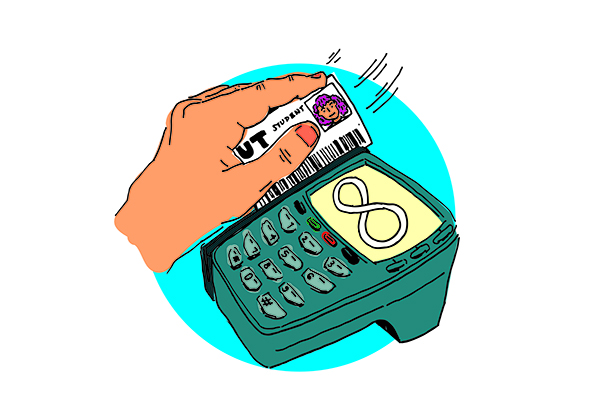UT-Austin students say Eco2Go program makes it harder for students to get to-go meals, practice COVID-19 safety
October 5, 2021
Eco2Go, a University Housing and Dining membership program that gives students a reusable box for dining hall food, was reinstated this month after a short hiatus, but will require students to join the program and pay a fee to take food to-go.
Students or faculty will need to pay a one-time charge of $5 to receive an Eco coin, which they can exchange for a to-go container when they swipe into the dining hall, according to the website. After they pay the one-time fee, students who have an unlimited meal plan will need to pay an additional $7.50 every time they use their to-go box in addition to one meal swipe. Students with the Longhorn 60 and Longhorn 25 meal plans will not need to pay the additional $7.50.
Eco2Go charged the same prices when it began in 2019, but students say in the pandemic, it is more important to be able to take food to-go.
Computer science freshman Megan Sickler said having the ability to take food outside of the dining hall was more than just a convenience for her.
“I got COVID last November, and I have lung damage from that,” Sickler said. “If I got COVID again, that could be potentially really dangerous for me. So at times when the dining hall is really crowded, I tend to try to avoid it.”
Undeclared freshman Kate Culpepper said she is frustrated with the Eco2Go program because now she cannot take food outside of the dining hall without enrolling in the program.
“Sometimes eating alone isn’t the most comfortable option,” Culpepper said. “I don’t understand why the University cares whether or not I bring food out of the dining hall. … We should be able to bring food out whenever we please or use our own tupperware.”
Earlier this semester, the University suspended the program due to a shortage of Eco2Go boxes, Mynor Rivera, director of dining operations, said. Rivera said the boxes are back in stock now, and the supply of other utensils, paper plates and bowls is not reliable.
“I have to call companies every day just to try and to see what is the inventory,” Rivera said. “It’s not like we can get a couple pallets every day.”
Rivera said the decision is in line with the University’s plan to return back to normal after the pandemic.
Sickler said the decision could harm immunocompromised students or students who don’t want to put their families at risk.
“We are not in a normal world right now,” Sickler said. “We’re still dealing with the effects of the pandemic, and there are still students like myself who could be hurt by getting COVID again.”











